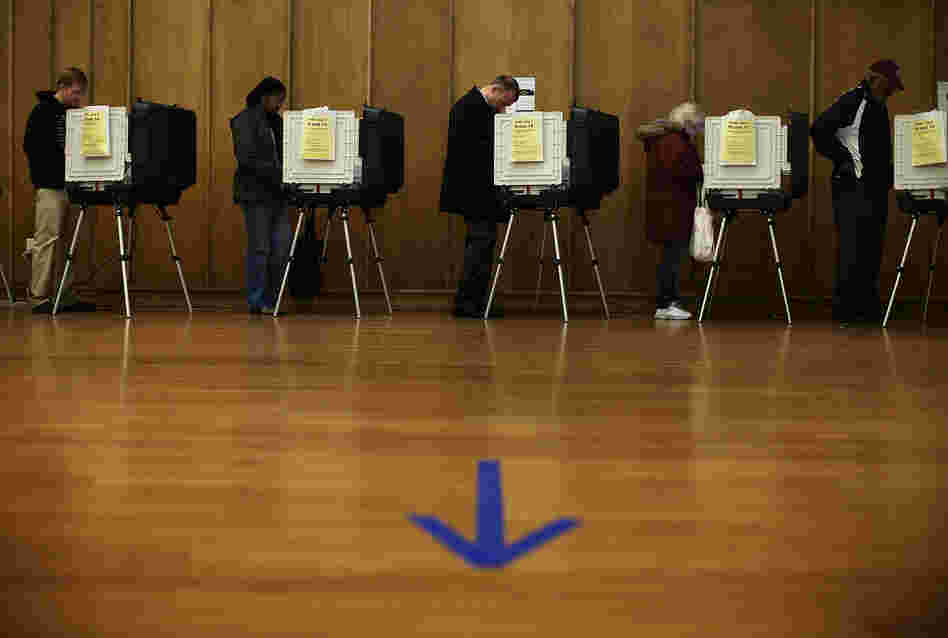
Voters cast their ballots as they participate in early voting Friday in Silver Spring, Md.

Voters cast their ballots as they participate in early voting Friday in Silver Spring, Md.
Alex Wong/Getty ImagesAs relentlessly as the candidates have courted voters, they've also shown their love to donors.
A recent report by the Center for Responsive Politics places the total cost of the 2012 elections at an estimated $6 billion, which would make it the most expensive election in U.S. history
President Obama and Republican presidential nominee Mitt Romney both rejected federal public financing â€" another first â€" and each of them collected nearly as much as the entire field in 2004.
That's largely due to many of the Watergate-era laws limiting campaign money that have been nullified or circumvented. The 2012 presidential election cycle marks the first since Citizens United, the Supreme Court ruling that swept away key restrictions on money from corporations and the wealthy.
Each side had its strength. President Obama's four million small donors have contributed online or even by text message.
At the non-partisan Center for Responsive Politics, analyst Bob Biersack says it's not just about technology â€" or liberals.
"There's nothing partisan about it," Biersack says, "You have to have some kind of spark."
Meanwhile, Romney's big-money backers also have been making contributions of a million dollars or more, often in secret, to superPACs and so-called social welfare organizations.
The outside groups kept Romney in the race during the primaries and then this summer and fall. Their attack ads kept his message on the air when he was short of cash.
Sheila Krumholz, executive director of the Center for Responsive Politics, says the big donors to outside groups on both sides have their own agendas.
"There is an expectation, I think, among many of these individuals that the rewards will go beyond mere gratitude," Krumholz says.
The clout of pro-Republican outside groups is even clearer in Senate and House races.
Political scientist Tony Corrado says that's because statewide and district-wide campaigns are relatively cheap.
"As you think about it, you know, one donor can finance the entire advertising for an independent group in a particular Senate or House race," Corrado says.
So then, the question is what happens when the candidates don't have the most prominent voices in the campaign.
It's already happening, according to an NPR analysis of data from ad-tracking firm, Kantar Media CMAG. Pro-Republican groups in Virginia have run four times as many ads as their candidate, George Allen. In Ohio, they've spent twice as much on broadcast ads as candidate Josh Mandel and the state GOP.
Corrado says the outside groups are pulling political power away from the traditional party organizations.
"Many of the groups that were active in 2010 were even more active in 2012, and I expect we'll see them active in 2014 and 2016."
And that's fine with Stephen Hoersting, a lawyer in the SpeechNow case,
the lawsuit decided after Citizens United that led directly to superPACs and their unlimited fundraising.
Hoersting says we'll soon be seeing a wide variety of superPACs.
"In the primaries you saw Gingrich's superPAC, so-called Winning Our Future, Romney's superPAC, so-called Restore Our Future. You're going to see many more organizations saying, 'We can do this, too,'" Hoersting says.
And he says that was just the first part of the plan when they filed the SpeechNow lawsuit.
"We had this idea that, if it freed things up as it has, then it would be leveraged."
Leveraged exactly because the outside groups could out-shout the conventional political players.
"The party committees and candidates, and really the incumbent officeholders, would have to take these limits off themselves to stay competitive."
We'll likely hear about this a lot more when battered and bruised members of Congress come back to town.


